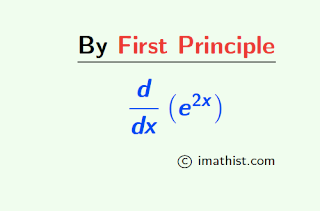Answer: The derivative of e^2x by first principle is equal to 2e2x. In this article, we will find the derivative of e to the power 2x using the first principle.
Recall that for a function f(x) in one variable x, the derivative of f(x) from first principle is given by the limit below:
$\dfrac{d}{dx}(f(x))$ $=\lim\limits_{h \to 0} \dfrac{f(x+h)-f(x)}{h}$ $\quad \cdots$ (i)

Let us now differentiate e to the power 2x by the first principle.
Derivative of e^2x by first principle
Taking f(x)=e2x in the above formula (i), we get the derivative of e2x from first principle as follows:
$\dfrac{d}{dx}(e^{2x})$ $=\lim\limits_{h \to 0} \dfrac{e^{2(x+h)}-e^{2x}}{h}$
$=\lim\limits_{h \to 0} \dfrac{e^{2x+2h}-e^{2x}}{h}$
$=\lim\limits_{h \to 0} \dfrac{e^{2x} \cdot e^{2h}-e^{2x}}{h}$ as we know that $e^{a+b}$ $=e^a\cdot e^b$
$=\lim\limits_{h \to 0} \dfrac{e^{2x}(e^{2h}-1)}{h}$
$=e^{2x} \lim\limits_{h \to 0} \dfrac{e^{2h}-1}{h}$ as the function $e^{2x}$ is independent of h, so we can take it out of the limit
$=e^{2x} \lim\limits_{h \to 0} \dfrac{e^{2h}-1}{2h}$ $\times 2$
Let $2h=t$. So $t \to 0$ as h tends to zero. So the above limit is
$=2e^{2x} \lim\limits_{t \to 0} \dfrac{e^t-1}{t}$
= 2e2x × 1, using the limit formula limx→0 $\dfrac{e^{x}-1}{x}$ = 1.
= 2e2x.
Thus the derivative of e to the power 2x is 2e^2x. We achieve this by the first principle of derivatives.
Question Answer on Derivative of e2x
Question 1: Find the derivative of e2x at x=0 from first principle.
Answer:
The derivative of e2x using the first principle is $2e^{2x}$ (see the above proof).
Thus, the desired derivative at x=0 is
$[\dfrac{d}{dx}(e^{2x})]_{x=0}$ $=[2e^{2x}]_{x=0}$ $=2e^{2\cdot 0}$ $=2e^0$ $=2 \times 1$ $=2$
So the derivative of e^2x at x=0 by the first principle is equal to 2.
Question 2: Find the derivative of e^2.
Answer:
Note that $e^2$ is a constant number as the number e is so. We know that the derivative of a constant is zero (For a proof of this fact, click the page on Derivative of a constant is 0). So we conclude that the derivative of e square is zero.
Also Read: